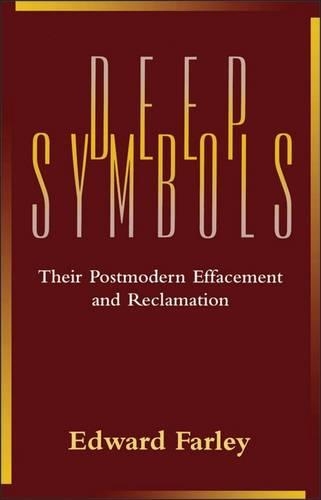
Deep Symbols: Their Postmodern Effacement and Reclamation
(Paperback)
Publishing Details
Deep Symbols: Their Postmodern Effacement and Reclamation
By (Author) Edward Farley
Continuum International Publishing Group Ltd.
Continuum International Publishing Group - Trinity
1st October 1996
United Kingdom
Classifications
General
Non Fiction
Theology
230
Physical Properties
Paperback
158
Width 138mm, Height 216mm
230g
Description
Here is an absorbing and exceptionally perceptive account of how deep symbols or words of power (which tend to be a culture's normaltive language) have undergone diminishment in a contemporary postmodern society. Edward Farley explains that such diminishment does not necessarily imply their demise since traces of these symbols remain and invite their rethinking. Two introductory chapters spell out the character and prospect of deep symbols in postmodern society. Then follow five chapters, each of which considers a particular deep symbol: tradition, obligation (duty), reality, law, and hope. A concluding chapter shows the structural entanglement of these symbols with each other and their relation to the sacred and the interhuman. From the opening chapter- "Words of power, that is, deep and enduring symbols that shape the values of a society and guide the life of faith, morality, and action are subject to powerful forces of discreditation and even disenchantment. If this is so, we must find ways to recover their power or live without them." Edward Farley is Professor of Theology at Vanderbilt University and the author of many books, including Good and Evil: Interpreting a Human Condition.
Reviews
"Edward Farley...applies his phenomenological expertise to several of what he terms deep symbols.' His strength is uncovering this persistent presence, at least the residues, of deep symbols... the chapter on reality is especially strong, where Farley deftly analyzes reasons for the loss of a sense of reality in secular and religious life and yet shows the way in which reference to the real is manifested in a postmodern context... This is a concise work, full of insight and wisdom, that communicates to a broad audience. The argument appeals to contemporary experience and is not laced with jargon." -- Dan R. Stiver, Southern Baptist Theological Seminary, reviewing for Anglican Theological Review -- Dan R. Stiver * Anglican Theological Review *
"This book will help preachers and other leaders in the religious community (and beyond) diagnose fundamental shifts that are taking place in our ethos. All seminary students known to me would profit from reading Farley's discussion of law." --Ronald J. Allen, Christian Theological Seminary, writing in ENCOUNTER, Summer 1997 -- Ronald J. Allen * Encounter *
"Helpfully aimed at a broad audience, which should include students of religion as well as leaders and laity in communities of faith, Deep Symbols is a wise and insightful work." --Martha J. Reineke, University of Northern Iowa, reviewing for Journal of the American Academy of Religion * Journal of American Academy of Religion *
"...an engaging critique of the demise of deep symbols...This book offers stimulating reading for all who consider such a task a central imperative of our time." --Lexington Theological Quarterly -- Larry Paul Jones * Lexington Theological Quarterly *
"[Deep Symbols is] very learned and scholarly...calmly and clearly written. Because [it is] very rich, [it does] not invite speedy reading, but each sentence, paragraph, and chapter is laid out with perfect clarity...the enduring value...lies in the deep, passionate compassion that imbues each page." --Wendy Farley, Emory University, reviewing for Religious Studies Review, April 1998 -- Wendy Farley, Emory University * Religious Studies Review *
"Farley takes central symbols (tradition, obligation, reality, law, and hope) and demonstrates their present atrophy and the prospect of their recovery. His approach is realistic and yet hopeful. A provocative theological/cultural analysis written in a style that is both absorbing and accessible." -- Anna Case-Winters, Religious Studies Review * Religious Studies Review *
"...thought-provoking book...Used in course preparation and seminar discussions, Farley's book can invite instructors and students to reflect self-critically on the words they use." -- Gilbert Ostdiek, O.F.M., Catholic Theological Union, reviewing for Teaching Theology and Religion -- Gilbert Ostdiek, O.F.M. * Teaching Theology and Religion *
"This excellent book directly addresses our social condition and cultural flux and comes to grips with what must be done to remedy them." -- John C. haughey, S.J., Loyola University, reviewing for Theological Studies * Theological Studies *
"He deals with five...symbols: tradition, reality, obligation (duty), law and hope. He asks two questions of each: What is the effect of postmodernity on the symbol Can an atrophied symbol be re-thought and re-enchanted' He concludes with reflections on how these words of power' are interrelated." --Theology Digest * Theology Digest *
"None...who read this book with understanding will ever step into a pulpit, or offer pastoral counsel, or teach a Sunday School class with the same perspective again. There will be new attentiveness to god-words born of the theological vision and understanding that is offered here. This book is and will be a challenge to the church." -- Ronald Olson, Luther Seminary, reviewing for Word and World -- Ronald Olson, Luther Seminary * Word and World *
Author Bio
Edward Farley is Professor of Theology at Vanderbilt University and the author of many books, including Good and Evil: Interpreting a Human Condition.
